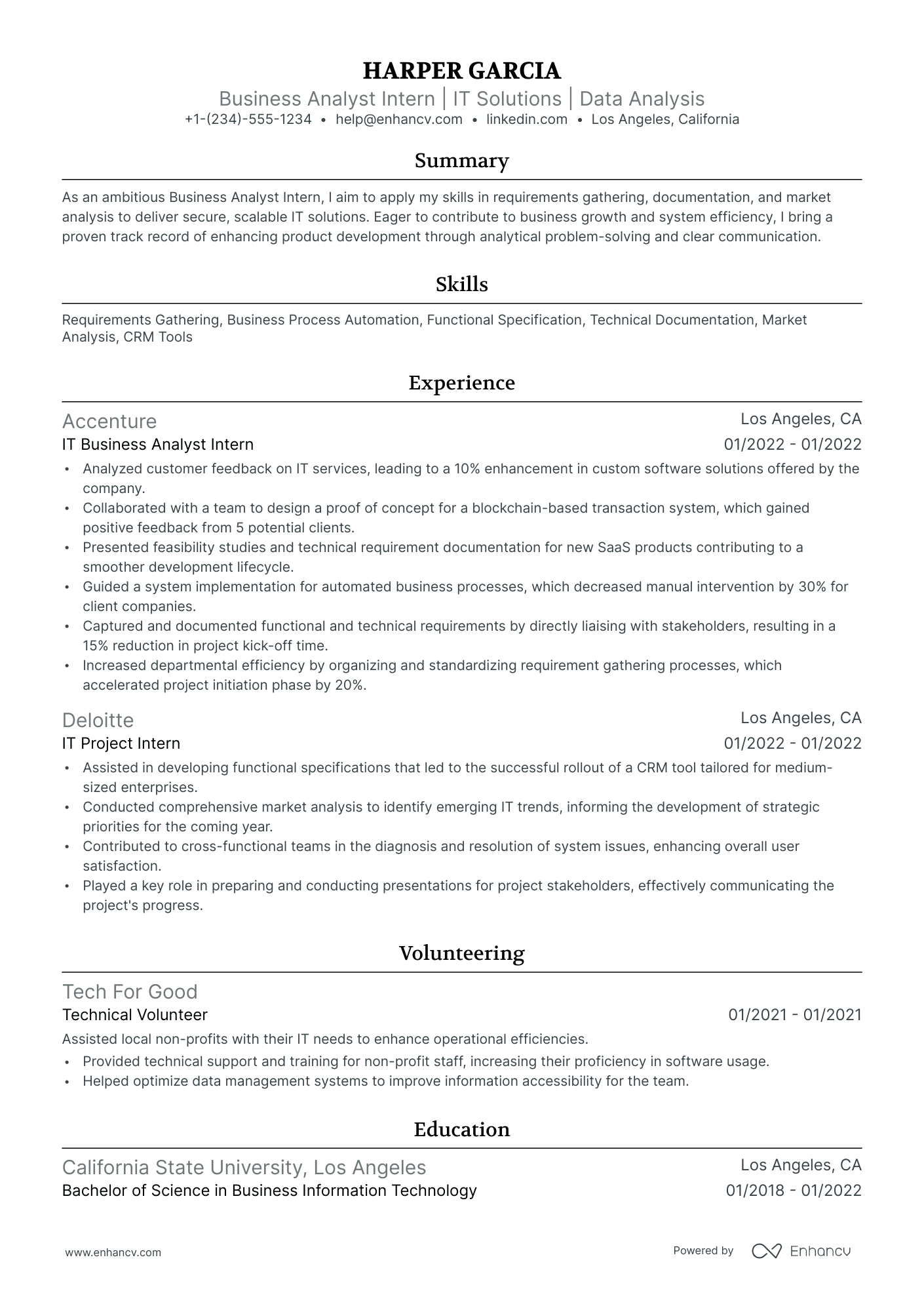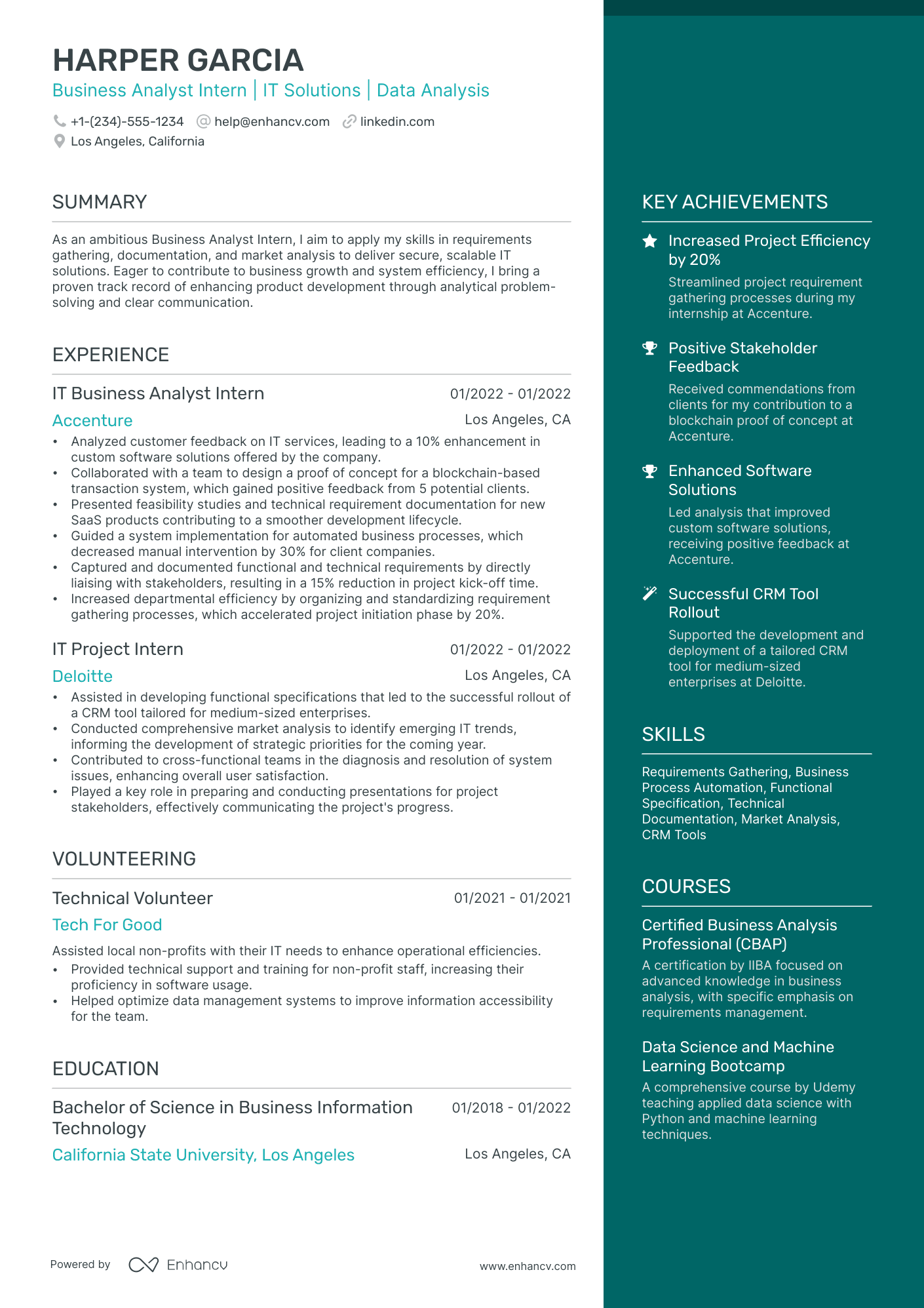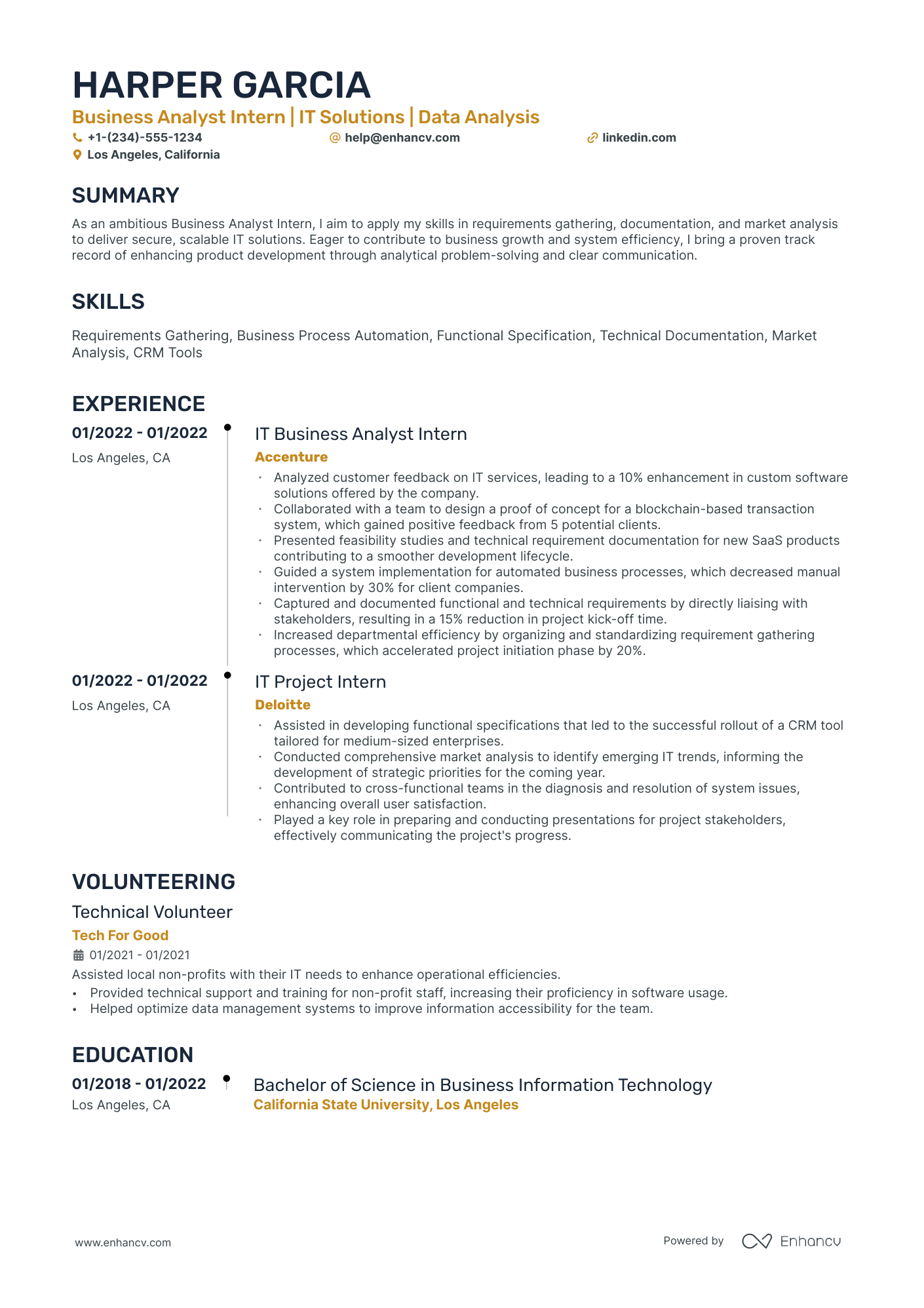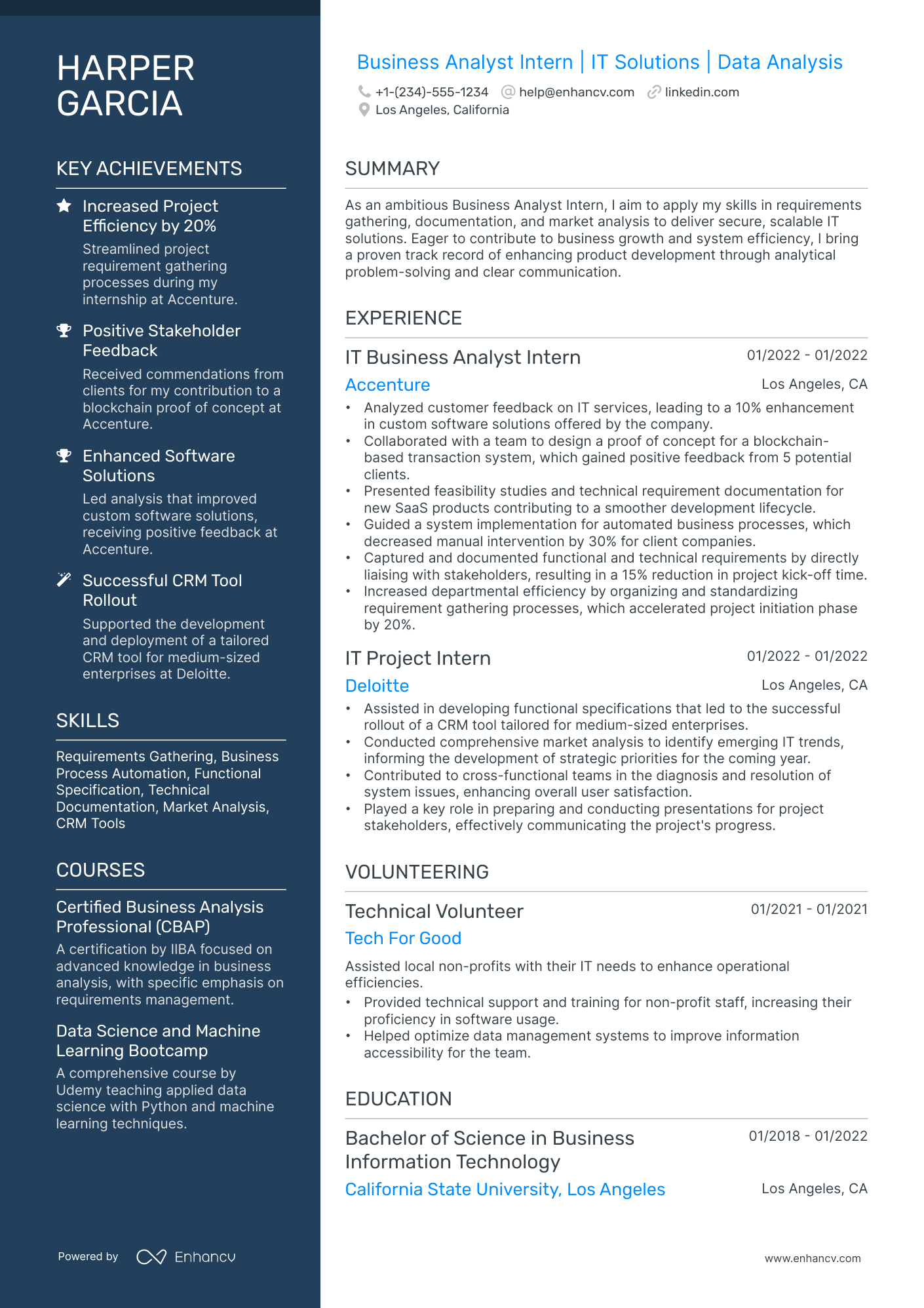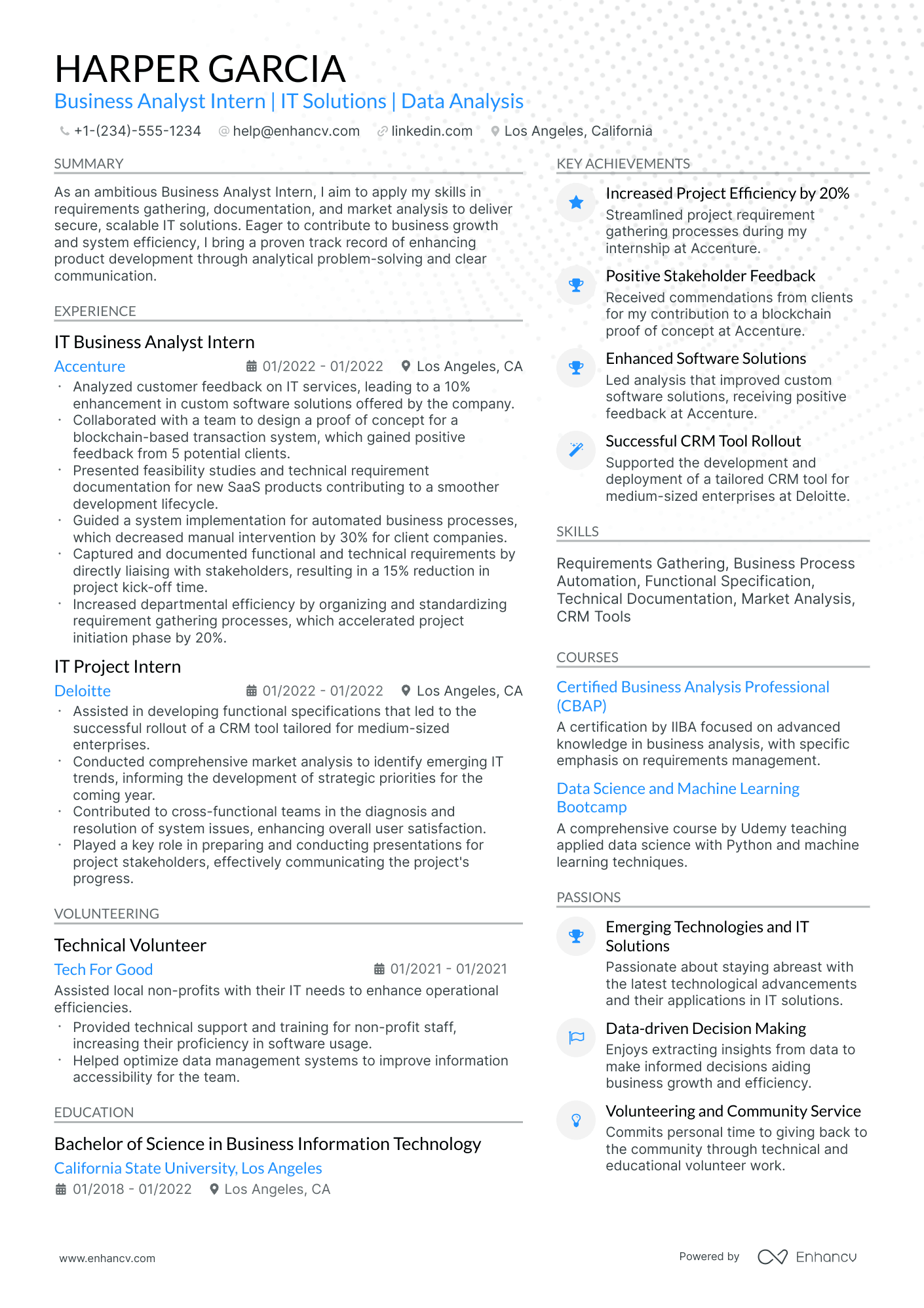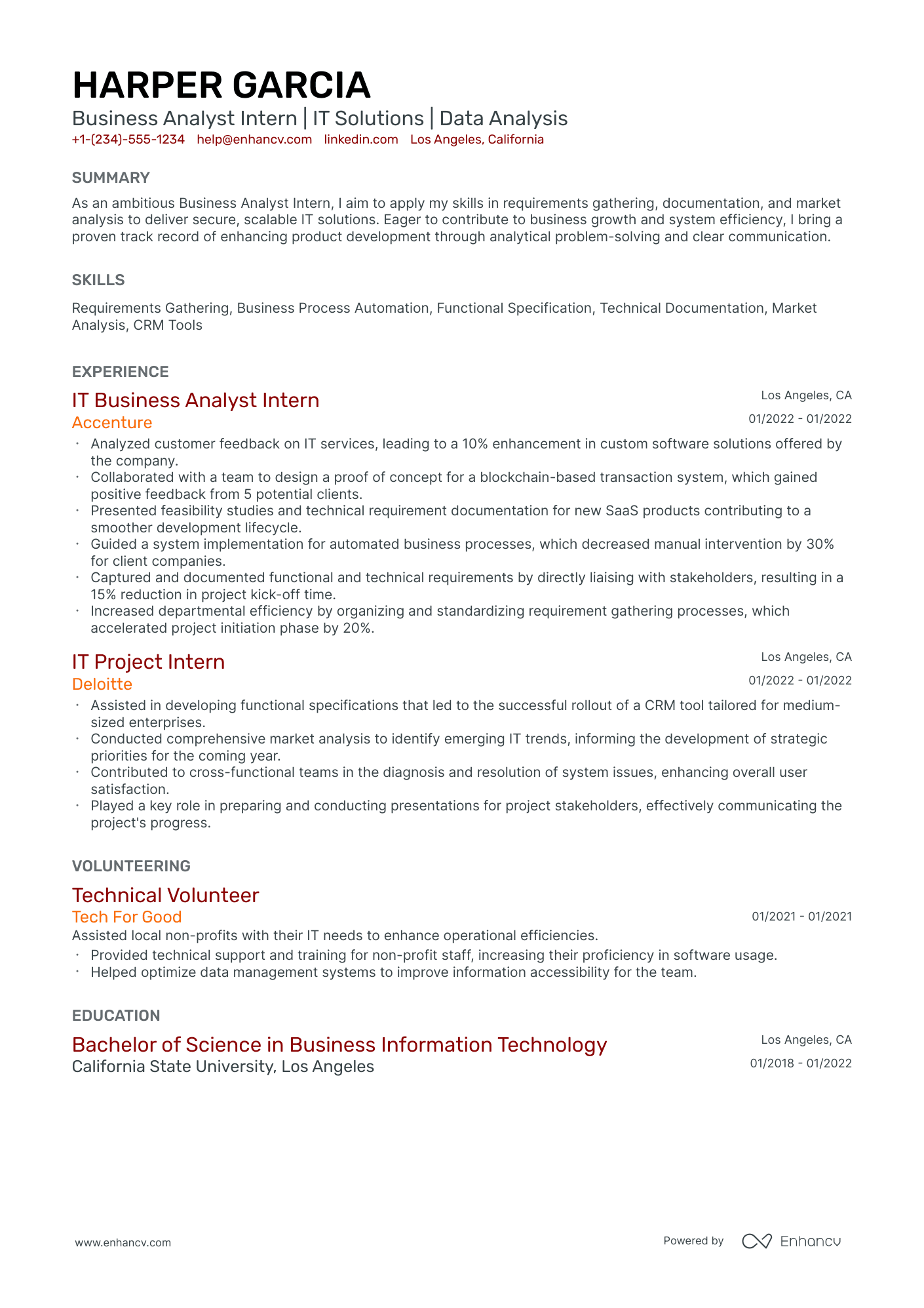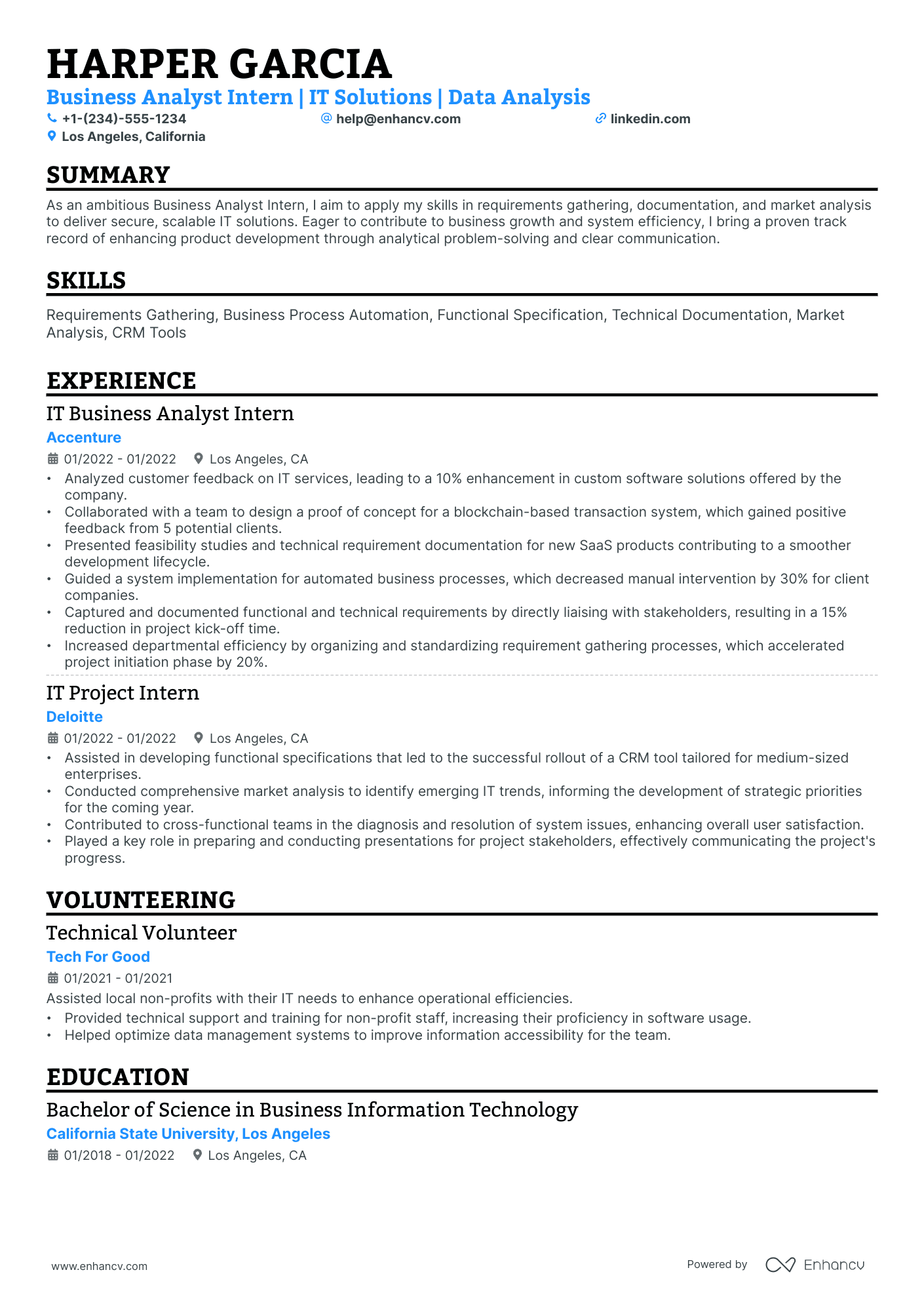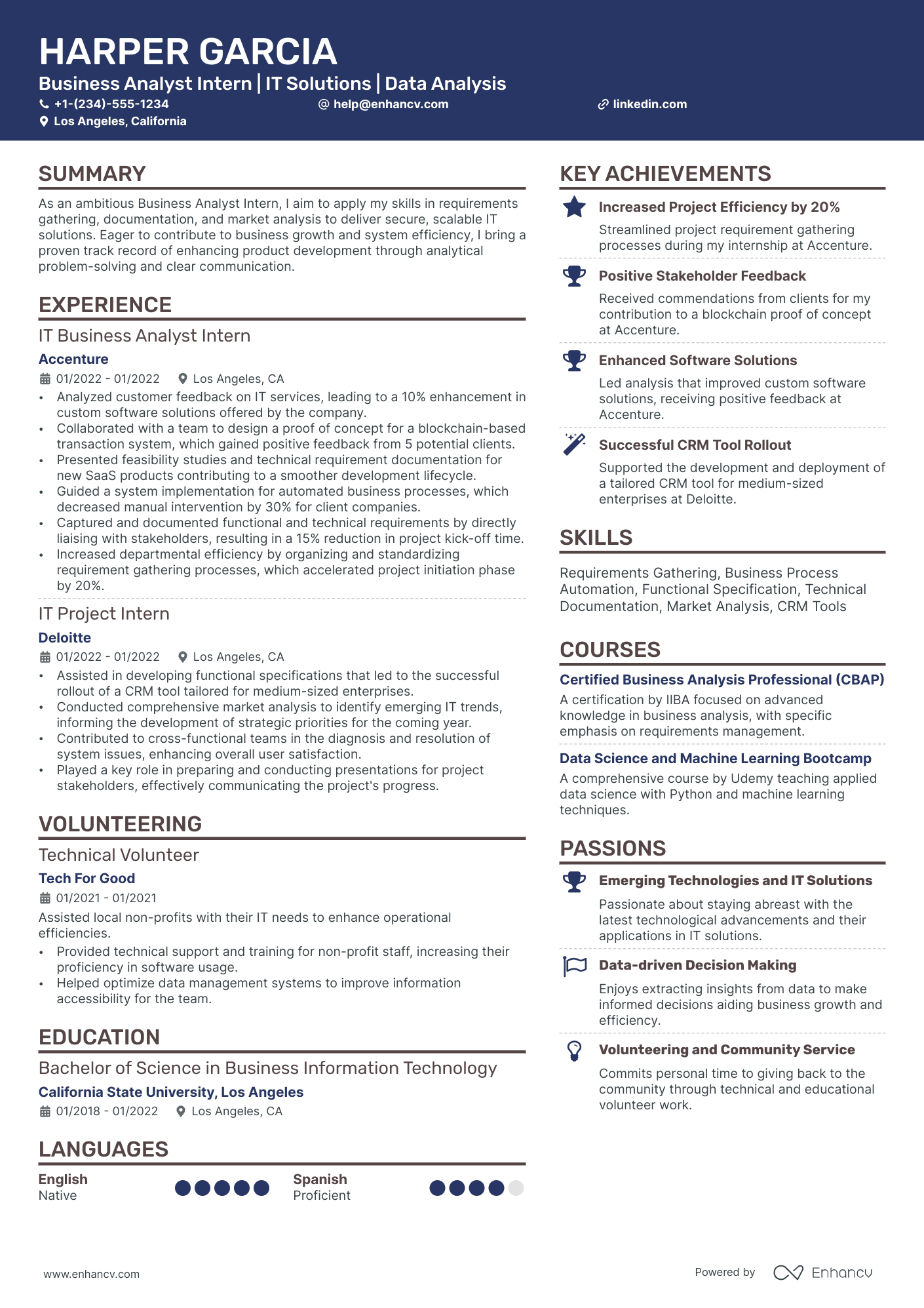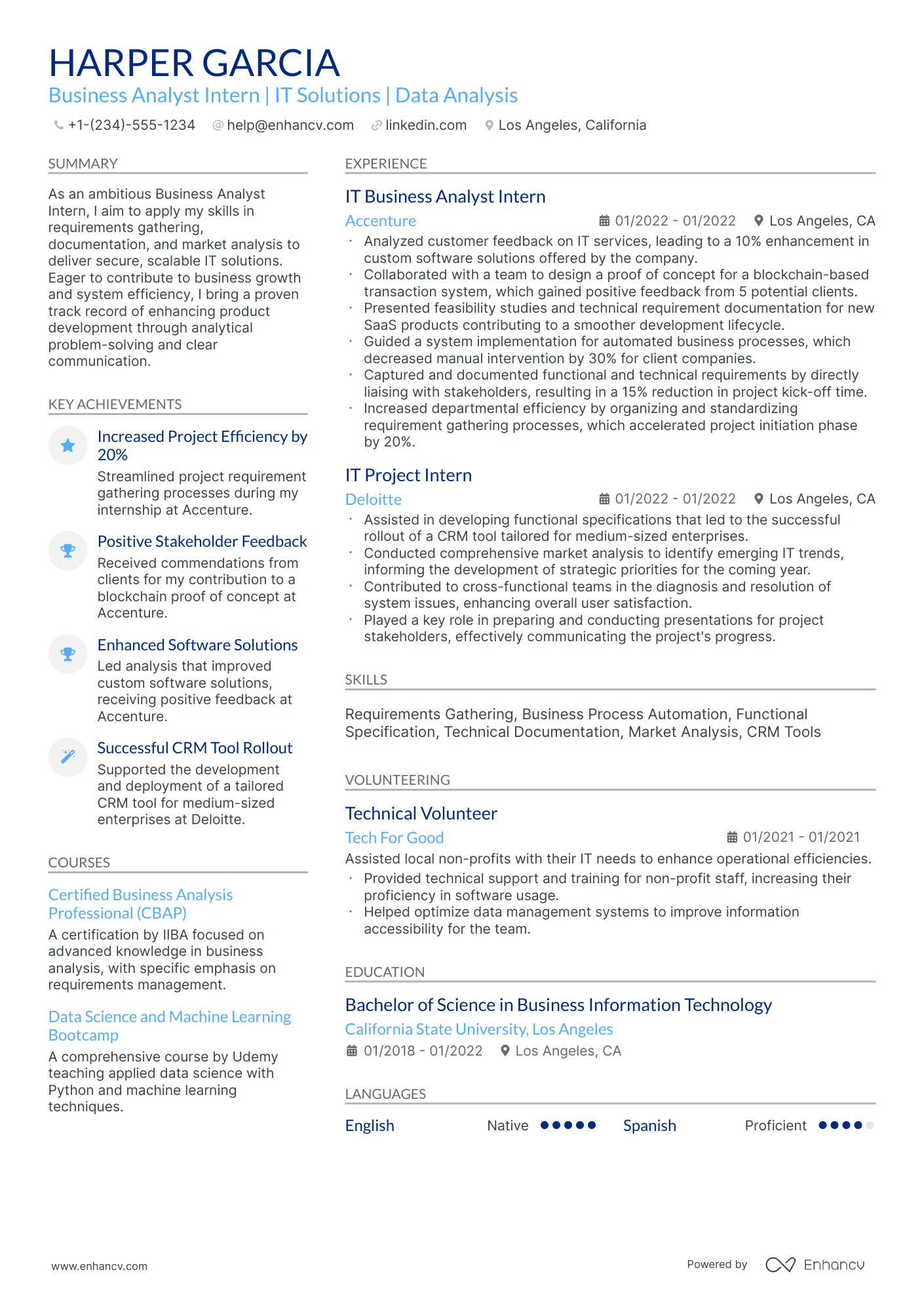A specific resume challenge faced by an entry-level business analyst is effectively showcasing analytical skills and relevant project experience when there is a limited professional work history. Our guide provides strategies for emphasizing academic projects, extracurricular activities, and transferable skills to highlight a candidate's potential value to employers, even with minimal traditional experience.
- Sample industry-leading professional resumes for inspiration and entry-level business analyst resume-writing know-how.
- Focus recruiters' attention on what matters most - your unique experience, achievements, and skills.
- Write various resume sections to ensure you meet at least 95% of all job requirements.
- Balance your entry-level business analyst technical expertise with personality to stand out amongst candidates.
- Marketing Operations Manager Resume Example
- Stock Manager Resume Example
- Strategic Planning Manager Resume Example
- Innovation Manager Resume Example
- Business Director Resume Example
- Supply Chain Business Analyst Resume Example
- Division Manager Resume Example
- Sales Operations Manager Resume Example
- Business Owner Resume Example
- Fedex Operations Manager Resume Example
simple guide to your entry-level business analyst resume format and layout
Successful entry-level business analyst resumes all have one specific characteristic - candidates have invested in a simple resume layout . One that is easy to read, makes a good first impression, and is adapted to their professional experience. There are three distinct resume formats to help you focus on your:
- professional experience - use the reverse-chronological resume format;
- skills and achievements - via the functional skill-based resume format;
- both experience and skills - with a hybrid resume format .
What is more, keep in mind that your resume may be initially assessed by the ATS (Applicant Tracker System) (or the software used by companies in the hiring process). The entry-level business analyst resumes that suit the ATS:
- have a header that includes either a role keyword or the job you're applying for;
- should be no longer than two pages;
- be submitted as PDF, unless specified otherwise.
Different markets have specific resume formats – a Canadian resume could vary in layout.
Upload & Check Your Resume
Drop your resume here or choose a file. PDF & DOCX only. Max 2MB file size.
PRO TIP
At the end of the day, what matters most to recruiters about your resume layout is how easy it is to scan and read. Unless you're applying for a role in a more creative field, you may opt to stick with a simple layout and formatting, and instead - focus on presenting your experience.
Ensure your entry-level business analyst resume stands out with these mandatory sections:
- Header - the section recruiters look to find your contact details, portfolio, and potentially, your current role
- Summary or objective - where your achievements could meet your career goals
- Experience - showcasing you have the technical (and personal) know-how for the role
- Skills - further highlighting capabilities that matter most to the entry-level business analyst advert and your application
- Certifications/ Education - staying up-to-date with industry trends
What recruiters want to see on your resume:
What recruiters want to see on your resume:
- Quantitative analysis proficiency, such as experience with Excel, data visualization tools (Tableau, Power BI), and statistical software (R, SPSS, SAS).
- Demonstrated understanding of business processes and ability to translate business requirements into technical specifications.
- Problem-solving abilities and examples of how you have used data to influence business decisions or solve business problems.
- Experience with SQL and knowledge of database management, reflecting the capacity to work with and analyze large datasets.
- Communication skills highlighted by experience in preparing clear and concise reports or presentations for technical and non-technical stakeholders.
What to do if you don't have any experience
It's quite often that candidates without relevant work experience apply for a more entry-level role - and they end up getting hired.
Candidate resumes without experience have these four elements in common:
- Instead of listing their experience in reverse-chronological format (starting with the latest), they've selected a functional-skill-based format. In that way, entry-level business analyst resumes become more focused on strengths and skills
- Transferrable skills - or ones obtained thanks to work and life experience - have become the core of the resume
- Within the objective, you'd find career achievements, the reason behind the application, and the unique value the candidate brings about to the specific role
- Candidate skills are selected to cover basic requirements, but also show any niche expertise.
How to quantify impact on your resume
- Highlight your role in quantitative projects by specifying the size of datasets you've worked with or the complexity of the financial models you've developed, demonstrating your ability to handle significant analytical tasks.
- Include any cost-saving measures you've identified and implemented, and quantify the savings, showcasing your direct contribution to the company's financial efficiency.
- Detail your experience with reporting tools and the number of reports you've generated, indicating your proficiency in interpreting and presenting data.
- Mention specific instances where your analysis directly influenced business decisions, including potential revenue gained or market share increase, to show your impact on strategic outcomes.
- Describe the scale of the teams or projects you've managed in terms of headcount or project budget, establishing your organizational and leadership capabilities.
- Quantify any improvements in operational efficiency, such as percentage reduction in process time or increased transaction speed, to exhibit your ability to streamline business processes.
- Document any experience you have with A/B testing or other forms of experimental analysis by detailing the scope and the resultant decision-making influence, which demonstrates your prowess in using data to drive innovation.
- Include the percentage of revenue growth or the financial performance of products you've analyzed to quantify your understanding of business growth drivers.
Action verbs for your entry-level business analyst resume
PRO TIP
It's most often the case that your resume will be scanned over by the Applicant Tracker System (ATS) or the software companies use to automate their recruitment process. Ensure that within your resume header, summary, and / or objective, you've included skills that are must-haves for the role.
Balancing hard and soft skills in your entry-level business analyst resume
Recruiters indeed pay close attention to the specific hard and soft skills candidates possess. Hard skills refer to technical abilities or your proficiency in technologies, while soft skills are the personal attributes and qualities developed over your lifetime.
If you're unsure about effectively quantifying these skills on your resume, follow our step-by-step guide. It's crucial to first understand the key job requirements for the role. Doing so enables you to accurately list your:
- Hard skills in sections like skills, education, and certifications. Your technical expertise is straightforward to quantify. Most organizations find it sufficient to mention the certificates you've earned, along with your proficiency level.
- Soft skills within your experience, achievements, strengths, etc. Defining interpersonal communication traits in your resume can be challenging. Focus on showcasing the accomplishments you've achieved through these skills.
Remember, when tailoring your entry-level business analyst resume for the Applicant Tracking System (ATS), ensure that the skills you list match exactly with those in the job requirements. For instance, if the job listing specifies "Microsoft Word," include this exact term rather than just "Word" or "MSO."
Top skills for your entry-level business analyst resume:
Data Analysis
SQL
Microsoft Excel
Business Intelligence Tools
Requirements Gathering
Data Visualization
Statistical Analysis
Process Mapping
Report Writing
Project Management
Analytical Thinking
Problem-Solving
Communication
Attention to Detail
Teamwork
Adaptability
Critical Thinking
Time Management
Active Listening
Organization
The top 5 certifications for your entry-level business analyst resume:
- Certified Business Analysis Professional (CBAP) - International Institute of Business Analysis (IIBA)
- Certification of Competency in Business Analysis (CCBA) - International Institute of Business Analysis (IIBA)
- Entry Certificate in Business Analysis (ECBA) - International Institute of Business Analysis (IIBA)
- Certified Analytics Professional (CAP) - INFORMS
- Professional in Business Analysis (PBA) - Project Management Institute (PMI)
PRO TIP
It's most often the case that your resume will be scanned over by the Applicant Tracker System (ATS) or the software companies use to automate their recruitment process. Ensure that within your resume header, summary, and / or objective, you've included skills that are must-haves for the role.
Your academic background: should you include your education and certifications on your entry-level business analyst resume?
Adding relevant education and certifications to your entry-level business analyst resume is beneficial, whether you're an experienced candidate or just starting in the field.
Featuring your higher education degree that aligns with the role demonstrates your commitment to the industry. On your entry-level business analyst resume, include the start and graduation dates, followed by the name of the institution that awarded your degree.
Regarding certifications, it's wise to list those most relevant to the role or that have contributed to your array of crucial technical or personal traits. Be sure to include the name of the certificate and the awarding institution.
If uncertain about which certifications to feature prominently on your entry-level business analyst resume, refer to our compiled list of the most in-demand ones for guidance.
PRO TIP
When creating your resume, select a template that is functional and features plenty of space for you to reflect upon your unique entry-level business analyst expertise.
Recommended reads:
PRO TIP
It's most often the case that your resume will be scanned over by the Applicant Tracker System (ATS) or the software companies use to automate their recruitment process. Ensure that within your resume header, summary, and / or objective, you've included skills that are must-haves for the role.
Recommended reads:
Adding a summary or objective to your entry-level business analyst resume
One of the most crucial elements of your professional presentation is your resume's top one-third. This most often includes:
- Either a resume summary - your career highlights at a glance. Select the summary if you have plenty of relevant experience (and achievements), you'd like recruiters to remember about your application.
- Or, a resume objective - to showcase your determination for growth. The perfect choice for candidates with less experience, who are looking to grow their career in the field.
If you want to go above and beyond with your entry-level business analyst resume summary or resume objective, make sure to answer precisely why recruiters need to hire you. What is the additional value you'd provide to the company or organization? Now here are examples from real-life entry-level business analyst professionals, whose resumes have helped them land their dream jobs:
Resume summaries for a entry-level business analyst job
- To leverage proficient analytical skills and a strong foundation in data analysis, coupled with advanced proficiency in Excel and SQL, to deliver insightful business solutions that align with company goals and drive growth within the financial services sector.
- Seeking to contribute an unwavering commitment to excellence and a comprehensive understanding of market trends to optimize operations and enhance decision-making processes in a dynamic tech startup.
- Aiming to employ a deep passion for data storytelling and a robust knowledge of statistical analysis and business intelligence tools to uncover actionable insights that will propel a leading healthcare organization towards its strategic objectives.
- Aspiring to utilize a keen eye for detail and a solid grounding in econometrics and project management methodologies to assist a multinational corporation in making data-informed strategies that maximize profitability and market share.
- Desiring to bring an energetic dedication to analyzing consumer behavior and implementing data-driven recommendations that contribute to the competitive advantage and overall success of an esteemed retail industry leader.
- Intent on applying a methodical approach to data interpretation and a suite of technical proficiencies in Python and BI software to deliver high-quality analytical support that helps a sustainable energy company innovate and thrive in a competitive market.
Beyond your entry-level business analyst resume basics - extra sections
Ensure your entry-level business analyst resume stands out from the crowd by spicing it up with a couple of supplementary sections that showcase your:
- Prizes - as a special nod to what matters most in the field;
- Projects - ones that would really further support your application;
- Hobbies - include only if you think they'd further your chances at landing the role with personality
- Community impact - to hint at the causes you care about.
Key takeaways
- Your entry-level business analyst resume is formatted professionally and creates an easy-to-read (and -understand) experience for recruiters;
- You have included all pertinent sections (header, summary/objective, experience, skills, certifications) within your entry-level business analyst resume;
- Instead of just listing your responsibilities, you've qualified them with skills and the results of your actions;
- Within your entry-level business analyst resume, you've taken the time to align specific job requirements with your unique expertise, showcasing the value you can provide as a professional;
- Technologies and personal skills are featured across different sections of your entry-level business analyst resume to achieve the perfect balance.
